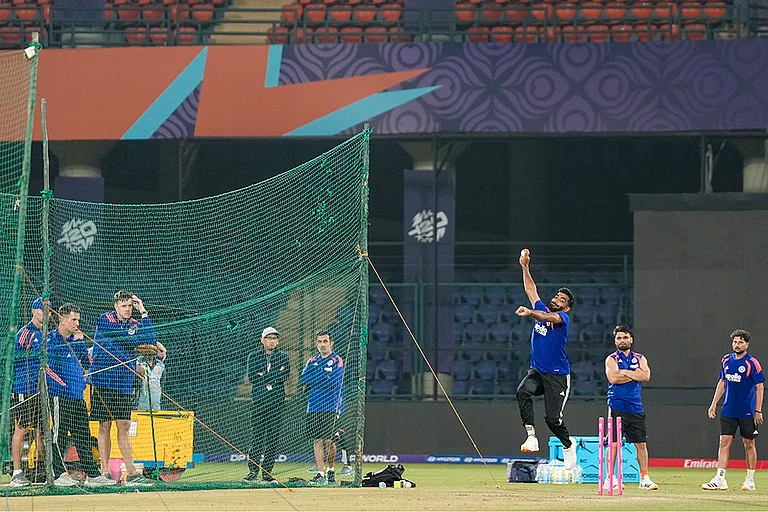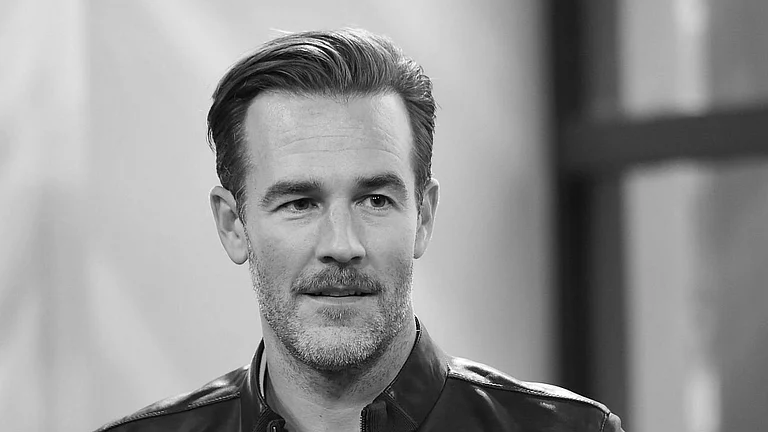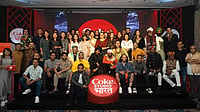After its successful first run in Mumbai, The F Word is traveling to Delhi for the first time on June 17 and will make its way back to Mumbai the following weekend for its second run. Presented by Aadyam Theatre (an Aditya Birla Group initiative), the play is a satirical take on the bittersweet dynamics of a dysfunctional family and their untold personal affairs and how it shapes the identities of the family members. It is directed by widely-acclaimed producer-writer-actor-director Akarsh Khurana and produced by Akvarious Productions.
The F word - where F stands for the other infamous word - Family, takes the audience on a rollercoaster ride of raw and complex emotions as the family confronts their past and present while grappling with the fragility of their relationships with one another. In this interview with Outlook, Akarsh Khurana talks about how he captures the indignities of aging with humour and pathos in his role as a writer, director, and more.
Excerpts from the interview:
Q. Despite the challenges faced by independent theatre groups in staying afloat, how has Akvarious been able to continue doing regular work for the past few years?
It is a constant struggle. For the first seven years, I was earning money from other jobs and losing it in the theatre. Till my father said I'd need to take a hard call and set some deadlines. If the company wasn't self-sufficient by such and such time, I would shut down. I gave myself a target of 10 years. In the ninth, a couple of our shows really broke out, and we got invited to a bunch of paying festivals, so we were not in the red anymore. Since then we've more or less managed to stay afloat. Theatre has paid for theatre, at least till the pandemic. The current scenario is not good at all, but we've been at it for 23 years. There's no stopping us now. The key is always having a cash cow of a production. That helps pay the theatre bills. Dekh Behen is our current breadwinner.
Q. How do you decide to work on a particular script? What are some of the key elements that you look for in a potential play?
I like telling good stories. I'm always searching for wholesome narratives, with a beginning, middle, and end which is not too sad. I prefer stories with closure. I'm not very good at abstract plays. Besides this, I gravitate towards stories about good people- Flawed, but deep down, good human beings. The feel-good factor is important to me now. We've dabbled in all sorts of genres, but there's been an emergence of our own Akvarious voice since 2010. Urban, contemporary, relatable plays usually tackle some sort of issue but through comedy. The messaging is subtle, the humour takes prominence, and hence the impact is more subliminal, or so we hope. I can't be preachy. And perhaps now I can't be flippant either.
Q. Please tell us about your newly launched podcast 'Unscripted with Akarsh Khurana'.
In 2021 and 2022 I was super busy with work for screens. Rashmi Rocket, Jugaadistan, Mismatched S02, some cineplays. So I decided to take a bit of a break and get back to the theatre. I've also turned producer on the film and series front, wanting to focus on telling stories I really want to tell, and as such it's become even harder for me to get work. Pitching is a long and frustrating process, and some projects fell apart, which added to that. Anyhow, to cut a long story short, I was relatively more free than I have been for a while. Rachna Panikker, who works with Hyperlink Brand Solutions, and is the boss lady of this season of Aadyam, got in touch regarding a theatre podcast, and I jumped at it. This was an opportunity to have genuine, freewheeling conversations with people from the fraternity. Thanks to the pandemic, everyone was online doing interviews and conversations, but the content was limited to obvious questions and answers. The tip of the iceberg. I wanted to dive deeper. And Aadyam was on the same page. I've been a guest on other podcasts, so having my own was exciting but also nerve-racking. It helped that the folks working on the project - Hyperlink, Idea Brew, Steve DSouza, and Aadyam's guardian angels.
Q) As a writer-director, how do you approach the task of engaging and connecting with your audience, both in your podcast and in your theatrical work? Are there any specific techniques or strategies you employ?
I don't think there is a technique or strategy as such. I've learnt that with content, relatability is the key. When an audience sees characters like themselves, or like people they know, who speak very much as they do, they automatically invest more. Of course, this is not to take away from abstract plays or foreign concepts, but I think a peg is necessary for engagement. Sure, you can go in and watch something and appreciate it for its craft or the experience it provides, but if you need to build a relationship with it or be affected by it, it needs to hit home. About 10 years into our journey, my brother, who is eight years younger, came back to India from Scotland, saw some of our plays and asked a very valid question. "Why on Earth would my friends want to watch this?" It made complete sense. We were alienating newer generations, sometimes in the pursuit of preconceived notions or high art. Perhaps that point is when there was some strategizing. We had to also do content that younger people around us gave a shit (cared) about. They were after all the future of our audience. And we were interacting with them daily, so we had the know-how. Even with the podcast, I really wanted to keep it freewheeling and casual. I think it is important to make all content more accessible. And for theatre especially to shun the elitist and high-brow image it had till not so long ago and be more welcoming.
Q. You're a writer, director, and an actor. Which one is closest to your sensibilities or do all of them come together to make you?
I am, as I often say, a very reluctant actor. So that's not top of my list. Having said that, I think whatever little acting I have done has helped me immensely with writing and directing. One job role I'd like to add to the mix is the producer. I enjoy that as well. So yes, it's a heady mix of writing, directing, and producing which makes up a rather unstable compound.
Q) Considering you have worked in the OTT space, how do you view its changing character? When it started, we witnessed several young directors bringing diverse content and ready to experiment with storytelling. Over the years, crime thrillers seem to be ruling, and everything seems to be according to an algorithm. What do you feel?
I mean, algorithms were always going to have a say in the business. I still stand by the belief that there is content for all kinds of audiences and audience for all kinds of content. Perhaps this is me convincing myself, in the hope that some of our stuff will get picked. I do think that commercial considerations are taking precedence, particularly post the pandemic, and during this supposed recession. With theatrical releases, bums on seats are key. With OTT, new subscriptions and high completion rates matter. And honestly, why shouldn't they? It is also the responsibility of the creators to increase the chances of success, however, it is currently being measured. Having said that, I feel like the decision-makers should not underestimate the audience. There is some rigidity and tunnel vision there. Also, content fatigue is a real thing. So more variety is needed. And good quality is always durable. So yes, the business is in a state of flux currently, which is skewing creative calls. But some balance will be restored after trial and error, one hopes. Fact is, like William Goldman once famously said, "Nobody knows anything".
Q) How much has growing up with your father Mr. Akash Khurana made you inclined towards the arts?
Quite a bit I would assume. The exposure to theatre started very early in my life, and then later to film writing. I began with a corporate job, but that too was in a movie studio. I grew up pretty obsessed with movies. And he had a big hand to play in what all I was watching. I'm an avid reader, like both my parents, and there was some valuable curation there too. So yes, whether they realized it or not, they were grooming me to be a storyteller. I believe DNA definitely played a part.
Q) In your upcoming original play, "The F Word," what themes or ideas do you explore? Can you give us a brief synopsis and share what inspired you to write this particular story?
The F Word is about dysfunctional families. Which is pretty much most families, though a lot won't admit it. It is a deeply personal and prolonged conversation about parents, children, marriage, ageing, resentment, nostalgia, and the importance, or lack, of communication. I've always had a fascination with dysfunctional families. And even though I get along pretty well with my father, who is acting in the play, I have noticed a common theme of daddy issues in a lot of the work I have done. Perhaps I just feel that deeply personal conflict between relatives can be mined for both comedy and pathos. This time around, when Aadyam is showcasing smaller productions such as ours, a burden was lifted. Scale and razzmatazz were no longer a priority or responsibility, and I could delve deep into a character-driven conversation piece. In my recent work, particularly the stuff I'm writing, I've been toying a lot with just people talking. Of course, this increases the onus on the writing and performances, but when done right, it's exhilarating. Carrying on that tradition, I decided to write The F Word. And given the responses at the opening run, I think we have a play that resonates with the audience.
Q) You work both in the theatre and cinema. How do both these mediums complete you?
I like working with actors to tell stories. That process remains the same irrespective of the medium. Besides that, everything is different. Filmmaking is much more technical and involves a lot more time, commitment, and effort. The steps and processes are very different, but I love them all. I enjoy shooting and thrive in post-production. Theatre is my happy place. It gives me more freedom and quicker gratification. But both these mediums are an integral part of me. I started my theatre company in 2000 and started writing for films in 2003. I've worked simultaneously in both streams for two decades now. I don't think one exists without the other anymore.
Q) Can you share any upcoming projects or future aspirations you have and what are you focusing on currently (films, theatre, OTT)?
We just opened Akvarious' 78th production (and our 10th for kids) - Go With The Flow - which my brother Adhaar has directed. It is among our most ambitious plays in recent times, with over 22 people on stage, most of whom are newcomers. Besides that on the theatre front, we open Dekh Behen 2 in August, we're working towards another run of A Small Family Business (produced by the NCPA), and I'll probably direct something next for the Prithvi Festival. In terms of work for screen, Mismatched S03 is being written by Gazal Dhaliwal and the team, so that will happen at some point. Besides that, we're developing a few films and series. I'm hoping I can shoot something post the monsoons, but don't have clarity on which project will come through first. So currently focusing on my recurring aspiration of travelling with our plays as much as possible.


























